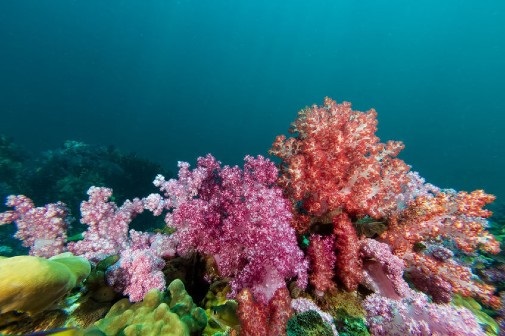Impacts of sunscreen on coral reefs needs urgent attention, say scientists
Posted on 31 March 2021
 Coral reefs are in decline, so more research is needed into potential impacts of sunscreen pollutants
Coral reefs are in decline, so more research is needed into potential impacts of sunscreen pollutants
The concerns over the number of cases of cancer as a result of overexposure to UV solar radiation, has led to extensive production and use of skin protection products. The chemical compounds used in these products, however, can enter the environment at the points of manufacture as well as through use by the consumer.
It is already understood that UV-filter compounds have toxic effects on marine organisms, but research in this area is limited and does not take into account certain variables, such as differences in environmental conditions.
In decline
Dr Brett Sallach, from the University of York’s Department of Environment and Geography, said: “Given the declining status of coral reef ecosystems and the many stressors they already face, it is important to identify the potential occurrence and toxicological risks associated with UV-filter exposure to reef ecosystems.
“Our research aimed to identify what research was out there and what gaps we had in our knowledge. Importantly we needed to understand what areas could be considered priority for future attention in order to understand the impacts of these products, and hopefully prevent any further damage to the environment.
“Undoubtedly products that can help protect against the harmful effects of UV radiation on human health are hugely important, and therefore we need reliable and extensive evidence to suggest any changes or scaling back of these products.”
Limitations
Researchers consulted with experts and industry representatives within the field of marine UV-filter exposure to understand the limitations of current research and what areas needed urgent attention.
They found that the majority of research on UV-filter compounds focuses on freshwater organisms and ecosystems, and that environmental conditions can either increase or decrease the response to toxic elements, making the true risk of the compounds difficult to establish.
This research does not translate easily to the unique ecology of coral reefs, and therefore long-term environmental monitoring would be needed in tropical and subtropical climates to understand the toxic effects here.
Policy makers
Yasmine Watkins, who led the work as part of her Masters degree in the Department of Environment and Geography, said: “We make four recommendations for priority research areas going forward, based on our consultation with experts. We need more work in the area of understanding UV-filter toxicity under different climate conditions, and long-term study into exposure and recovery of coral reefs.
“We also need to know realistic exposure to these compounds and how long they exist in the marine environment, to determine what the ‘safe’ limits are.”
Researchers aim to highlight these priority areas to better inform regulators and policy makers to improve conservation and management of coral reefs, whilst ensuring that human health can continue to be protected by UV-filter products.
Explore more news

Sodium channels in breast cancer cells a promising target for future treatments, study reveals
Thursday 25 July 2024

Cooling the classroom: University of York researchers to investigate UK schools’ responses to hot weather
Wednesday 24 July 2024

Hunter-gatherers kept an 'orderly home' in the earliest known British dwelling, study shows
Tuesday 23 July 2024

Study uses Game of Thrones to advance understanding of face blindness
Tuesday 23 July 2024

York academic contributes to new report on men’s health which reveals disparities between most and least deprived areas in the UK
Wednesday 17 July 2024
Media enquiries
About this research
The research is published in the journal Integrated Environmental Assessment and Management.
